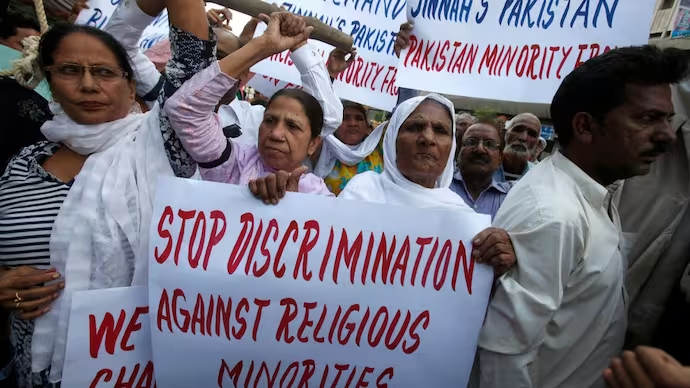Pakistan’s real enemy lies within: The army’s Kashmir business model
- Rishi Suri

- Apr 17
- 4 min read
On April 16, 2025, Pakistan’s Chief of Army Staff, General Asim Munir, once again delivered a speech full of the usual bombast — invoking Kashmir as Pakistan’s “jugular vein” and vowing eternal commitment to its "liberation." It was a message steeped in the familiar rhetoric of grievance and victimhood, but behind the emotional posturing lies a darker, unspoken truth: Kashmir is not Pakistan’s jugular vein; it is the financial lifeline of its army’s corrupt elite.

For decades, Pakistan’s military has used the Kashmir conflict as both a political tool and a commercial enterprise. Far from genuinely fighting for the Kashmiri people, the Pakistan Army has weaponized their plight to justify bloated defense budgets, secure perpetual control over the nation’s political machinery, and create a parallel economy insulated from civilian scrutiny. General Munir’s speech only reinforced how deeply entrenched this self-serving system has become.
Kashmir: Not a Cause, But a Commodity
Every few months, a Pakistani general dusts off the old rhetoric, calling Kashmir Pakistan’s "unfinished agenda" and its “moral responsibility.” Yet, if one were to lift the veil of propaganda, it would become clear that Kashmir is a business model for Rawalpindi’s generals, not a national cause.
Billions of dollars in military funding are allocated each year under the pretext of the “Kashmir cause.” This money is funneled into the army’s sprawling economic empire — which includes cartels in real estate (the Defense Housing Authorities, or DHAs, across Pakistan), construction, banking, and agriculture. The Kashmir conflict provides the moral justification for maintaining the army’s oversized share of the national budget — even as ordinary Pakistanis face record inflation, power outages, and chronic food insecurity.
Meanwhile, the "war effort" is used to siphon international aid, blackmail Western allies with the threat of "instability" or "Islamist blowback," and line the pockets of generals who retire as multimillionaires. The plight of the ordinary Kashmiri is little more than a photo-op during speeches and commemorations orchestrated by the Inter-Services Public Relations (ISPR).
A Nation Hollowed Out by Its Own Army
The Pakistan Army’s corruption does not end with Kashmir. It is the single largest obstacle to Pakistan’s progress — political, economic, and social. Every democratic government that tried to assert civilian supremacy has been overthrown, intimidated, or manipulated into submission by the military establishment.
Today, Pakistan teeters on the edge of economic collapse, not because of foreign conspiracies, but because of decades of disastrous policies directed by generals who fancy themselves as philosopher-kings. Under their misrule, Pakistan squandered its industrial potential, destroyed independent institutions, and isolated itself diplomatically. The hollow Islamic slogans they peddle at home serve only to distract from their own record of failure.
The army’s shadow economy is massive. From running corporate conglomerates like Fauji Foundation and Askari Group to appropriating prime real estate across cities, the army controls an estimated $100 billion worth of business interests. This is money that should have been spent on education, healthcare, and infrastructure for Pakistan’s people. Instead, it bankrolls the lavish lifestyles of generals and their families, while over 40% of Pakistan’s population struggles below the poverty line.
General Munir’s Misleading Crusade
General Asim Munir tried to project an image of patriotism, resolve, and moral superiority during his speech. But no amount of rhetorical flair can mask the truth: the Pakistan Army has become a mafia masquerading as a national institution.
It was particularly galling to hear him lecture about the sacrifices made for Kashmir when the army has routinely abandoned genuine Kashmiri activists, sold out its supposed allies for political deals, and prioritized its own survival over any real solution to the conflict. The “sacrifices” are real — but they have been borne by poor Pakistani soldiers from rural backgrounds, not the generals dining in DHA mansions.
Moreover, General Munir’s lament about Pakistan's "external enemies" conveniently ignored the real threat: the rot within. Pakistan has been brought to its knees not by India, not by the United States, and not by an imagined Zionist conspiracy, but by the venal, self-serving actions of its own military establishment.
The Tragedy of a Nation Held Hostage
Today, Pakistan stands as a tragic example of a nation cannibalized by its own protectors. Its civilian institutions are hollowed out, its media muzzled, its judiciary intimidated. No political leader, no matter how popular, can survive without the army’s blessing — and no meaningful reform is possible until the military’s stranglehold is broken.
The army’s addiction to conflict — be it in Kashmir, Afghanistan, or Balochistan — ensures that peace is always just beyond reach. Permanent conflict justifies permanent power. And the Pakistani people are the ones who pay the price: in blood, in poverty, and in lost futures.
General Asim Munir’s speech, for all its theatrics, inadvertently revealed the truth. When he invoked Kashmir as Pakistan’s jugular vein, he was right — but not in the way he intended. Kashmir has become the vein through which the Pakistan Army siphons the nation’s lifeblood for its own survival, power, and profit.
Until Pakistan confronts the reality that its military — not India, not the West, not Israel — is its greatest internal threat, it will remain a nation in decline, shackled by the very institution that was supposed to defend it.








Comments